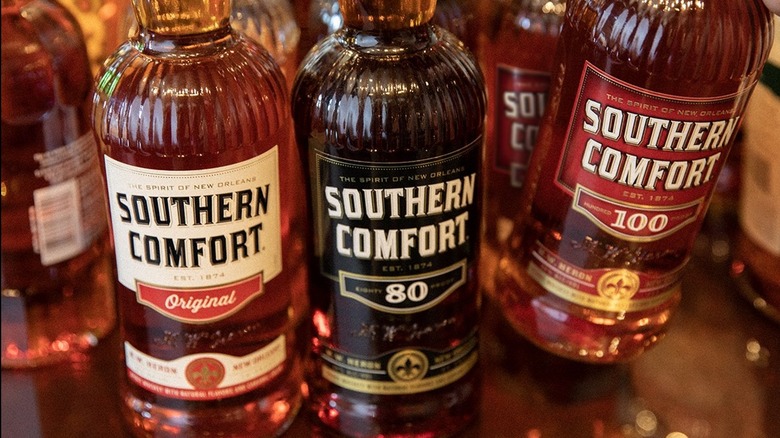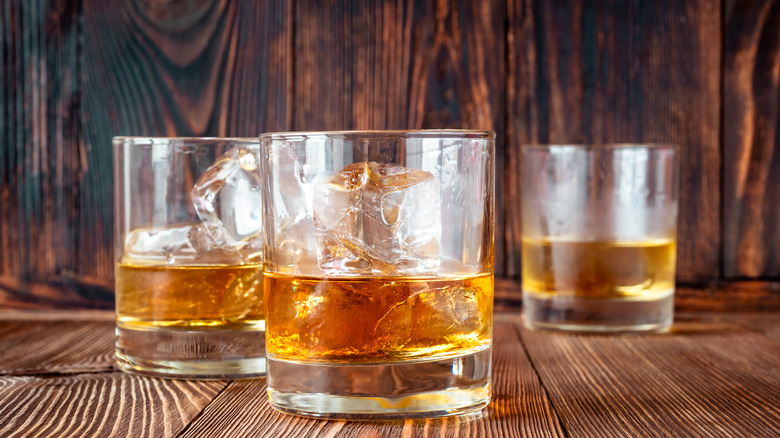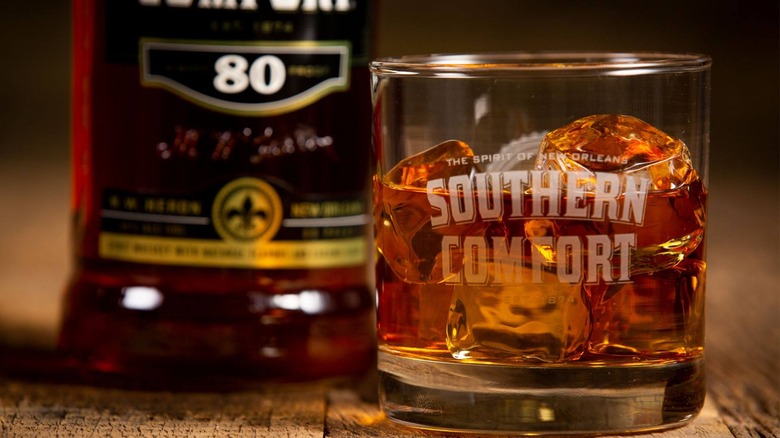Is Southern Comfort A Type Of Whiskey?
Adored by some and reviled by others, Southern Comfort is a drink known to divide opinion. Some know it best as Janis Joplin's signature stage companion; to others, it's something you had in college once or twice and probably shouldn't have. But before judging the sweet, brown booze, let's get one thing straight: it's whiskey, right?
The answer to that isn't exactly simple. For one thing, the recipe has changed dramatically several times since the drink's inception in the late 1800s, and today, Southern Comfort has multiple products on shelves, all with different specifications that affect how they're legally classified. Bottles labeled "Southern Comfort Original" can contain a diverse range of beverages depending on the jurisdiction in which it's being sold, including 30-proof and 42-proof malt liquors and a 70-proof whiskey-based drink. What all of these versions have in common, however, is that technically, none of them are whiskey.
Under U.S. law, for a spirit to be categorized as whiskey, it needs to be bottled at no less than 40% alcohol by volume, or 80 proof (in the U.S., "proof" refers to the ABV times two). So technically, only Southern Comfort Black and Southern Comfort 100, which are 80 and 100 proof, respectively, are actually whiskey. The other versions are either malt beverages or whiskey liqueurs. And if you haven't had SoCo recently, you may not have tried any of them.
Ice-cold comfort
No matter what kind of Southern Comfort you may have had, they're all alcoholic drinks that combine the flavors of whiskey, fruit, and spices — but that's about where the similarities end. The 30 and 42-proof SoCos, being malt liquors, aren't spirits at all. Legally, they're in the same category as beer and other malt drinks, like Mike's Hard Lemonade and Smirnoff Ice, so you can buy them in places that don't have full liquor licenses. They contain negligible amounts of real whiskey, if any (the recipes aren't publicly available), purely for flavoring.
The 70-proof SoCo, however, is made with actual whiskey — though since it's under the legal ABV standard for whiskey, it's technically considered a whiskey-based liqueur, not strong enough to be considered whiskey itself, similar to Fireball. Southern Comfort Black and 100, however, count as full-fledged blended whiskeys that include additional flavorings.
All of this only applies to the versions of SoCo sold in the U.S. Some of the brand's products, like a 60-proof version and some ready-to-drink cocktails, are only available in other countries. But no matter where you are, look at the label to know exactly which version you're drinking. A 15% ABV malt beverage is very different from a 50% ABV flavored spirit.
Not the SoCo you know
If the last time you had Southern Comfort was before 2016, you can forget everything you know about the taste. The drink's original formulation, made in 1874 by a New Orleans bartender Martin Wilkes Heron, mixed poor-quality Kentucky bourbon with fruit and spices to improve its flavor. But Heron died in 1920, and when the brand relaunched post-Prohibition, its new ownership ditched whiskey in favor of less expensive, neutral grain spirits like vodka. For most of its history, the proudly Southern beverage contained no whiskey.
But in 2016, SoCo was purchased by Sazerac, another historic alcohol brand with New Orleans roots, and the SoCo, known for most of the 20th century, was no more. The new ownership reformulated the flavored booze, again making real whiskey the base of the 70-proof SoCo Original and later introducing the boozier Black and 100 versions. So if it's been a minute since you've mixed up an Alabama Slammer, it's worth another go. Try it with the 70, 80, and 100-proof versions to see which strikes your perfect balance between fruity sweetness and a boozy kick.


